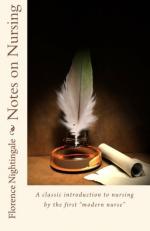It has been observed that a small quantity of beef tea added to other articles of nutrition augments their power out of all proportion to the additional amount of solid matter.
The reason why jelly should be innutritious and beef tea nutritious to the sick, is a secret yet undiscovered, but it clearly shows that careful observation of the sick is the only clue to the best dietary.
[Sidenote: Observation, not chemistry, must decide sick diet.]
Chemistry has as yet afforded little insight into the dieting of sick. All that chemistry can tell us is the amount of “carboniferous” or “nitrogenous” elements discoverable in different dietetic articles. It has given us lists of dietetic substances, arranged in the order of their richness in one or other of these principles; but that is all. In the great majority of cases, the stomach of the patient is guided by other principles of selection than merely the amount of carbon or nitrogen in the diet. No doubt, in this as in other things, nature has very definite rules for her guidance, but these rules can only be ascertained by the most careful observation at the bedside. She there teaches us that living chemistry, the chemistry of reparation, is something different from the chemistry of the laboratory. Organic chemistry is useful, as all knowledge is, when we come face to face with nature; but it by no means follows that we should learn in the laboratory any one of the reparative processes going on in disease.
Again, the nutritive power of milk and of the preparations from milk, is very much undervalued; there is nearly as much nourishment in half a pint of milk as there is in a quarter of a lb. of meat. But this is not the whole question or nearly the whole. The main question is what the patient’s stomach can assimilate or derive nourishment from, and of this the patient’s stomach is the sole judge. Chemistry cannot tell this. The patient’s stomach must be its own chemist. The diet which will keep the healthy man healthy, will kill the sick one. The same beef which is the most nutritive of all meat and which nourishes the healthy man, is the least nourishing of all food to the sick man, whose half-dead stomach can assimilate no part of it, that is, make no food out of it. On a diet of beef tea healthy men on the other hand speedily lose their strength.
[Sidenote: Home-made bread.]
I have known patients live for many months without touching bread, because they could not eat baker’s bread. These were mostly country patients, but not all. Home-made bread or brown bread is a most important article of diet for many patients. The use of aperients may be entirely superseded by it. Oat cake is another.
[Sidenote: Sound observation has scarcely yet been brought to bear on sick diet.]
To watch for the opinions, then, which the patient’s stomach gives, rather than to read “analyses of foods,” is the business of all those who have to settle what the patient is to eat—perhaps the most important thing to be provided for him after the air he is to breathe.




